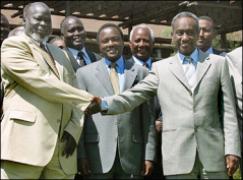Sudan VP, rebel chief hold talks in Kenya to end Africa’s longest war
By Bogonko Bosire
NAIVASHA, Kenya, Sept 5 (AFP) — Sudanese Vice President Ali Osman Taha and southern rebel leader John Garang held talks here Friday aimed at reviving Sudan’s stalled peace process, amid pressure for the two sides to quickly reach a settlement and end Africa’s oldest civil war.
 “The whole world is putting pressure on Khartoum and the (rebel) Sudan People’s Liberation Army (SPLA) to reach a peace agreement,” Kenyan Foreign Minister Kalonzo Musyoka told journalists.
“The whole world is putting pressure on Khartoum and the (rebel) Sudan People’s Liberation Army (SPLA) to reach a peace agreement,” Kenyan Foreign Minister Kalonzo Musyoka told journalists.
Taha and Garang began meeting behind closed doors on Thursday night and the talks were continuing Friday.
“They are determined to bring peace to their country and have agreed that this process is irreversible,” said Musyoka.
One of the mediators, Eritrea’s Ambassador to Kenya Mohamed Omaro, described the meeting as “a do-or-die session”.
“Delegates surely cannot go to the next round of talks with good morale if these two leaders fail to agree,” said Omaro.
“The main problem is not the IGAD-drafted framework but lack of goodwill,” he added.
East African regional body, the Intergovernmental Authority on Development (IGAD), is mediating the Sudanese peace process.
Talks between Khartoum and the SPLA struck a breakthrough accord in July 2002 granting the south the right to self-determination after a six-year transition period and exempting this mainly Christian and animist region from Islamic laws practised in Khartoum.
Subsequent rounds of talks focused on how to share power and resources during the six-year interim period of self-rule for southern Sudan.
But Khartoum has rejected a draft final document unveiled by IGAD mediators, charging that implementing the measures would lead to the oil-rich south seceding.
Khartoum’s stance on the final draft led to the peace process stalling on August 23.
“This is the determining point for the peace talks,” chief mediator Lazaro Sumbeiwyo, a former Kenyan army general, said.
“Both leaders are under tremendous pressure to go back home with a deal,” added Sumbeiywo.
A mediator who asked not to be named said that if Taha and Garang failed to agree on the way forward for the peace process, IGAD would “propose that both leaders form a committee that would draft another framwork to be the basis of negotiations.”
Musyoka said that the main bones of contention that caused the deadlock in August were “security arrangements, wealth-and power-sharing and three disputed areas — Southern Kordofan, Abyei and Southern Blue Nile.”
The SPLA wants to keep its army intact during the six-year transition period, but Khartoum views this as a possible precursor to secession.
Khartoum also considers the three disputed areas to be outside southern Sudan, but the SPLA maintains that the people of the regions have given them the mandate to negotiate with the government on their behalf.
Musyoka said that Taha and Garang had agreed that the Naivasha meeting will go on “as long as it takes, so long as there is progress.”
“I am very optimistic that the consultations between the two leaders will make progress. I am very encouraged by the statement by Garang when he arrived in Kenya that they have come to unlock the peace process,” Musyoka said.
Khartoum government minister Nafie al-Nafie, who accompanied Taha to the meeting here Thursday, was quoted in Sudan’s daily al-Anbaa newspaper as saying the talks were being held in a “cordial atmosphere.”
“Things are progressing satisfactorily,” Nafie said.
Sudan, Africa’s largest country, has suffered civil unrest since independence in 1956, but the current civil war started in 1983 when the SPLA took up arms to end domination of the south by Khartoum.
The war has, directly and indirectly, killed more than 1.5 million people and displaced more than four million others.
